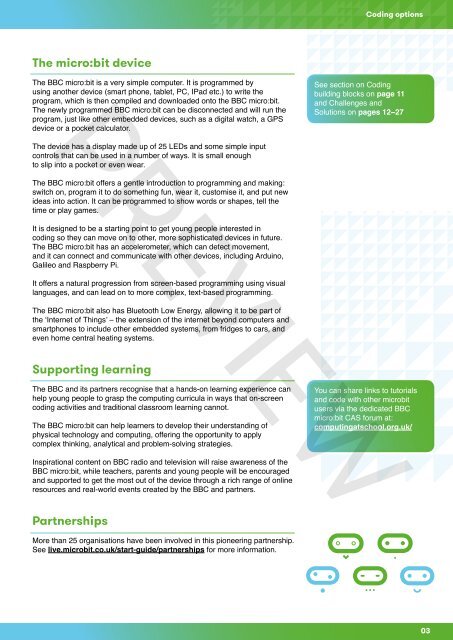MicroBit-Quick-Start-Teacher-Guide
MicroBit-Quick-Start-Teacher-Guide
MicroBit-Quick-Start-Teacher-Guide
Create successful ePaper yourself
Turn your PDF publications into a flip-book with our unique Google optimized e-Paper software.
Coding optionsThe micro:bit devicePREVIEWThe BBC micro:bit is a very simple computer. It is programmed byusing another device (smart phone, tablet, PC, IPad etc.) to write theprogram, which is then compiled and downloaded onto the BBC micro:bit.The newly programmed BBC micro:bit can be disconnected and will run theprogram, just like other embedded devices, such as a digital watch, a GPSdevice or a pocket calculator.See section on Codingbuilding blocks on page 11and Challenges andSolutions on pages 12−27The device has a display made up of 25 LEDs and some simple inputcontrols that can be used in a number of ways. It is small enoughto slip into a pocket or even wear.The BBC micro:bit offers a gentle introduction to programming and making:switch on, program it to do something fun, wear it, customise it, and put newideas into action. It can be programmed to show words or shapes, tell thetime or play games.It is designed to be a starting point to get young people interested incoding so they can move on to other, more sophisticated devices in future.The BBC micro:bit has an accelerometer, which can detect movement,and it can connect and communicate with other devices, including Arduino,Galileo and Raspberry Pi.It offers a natural progression from screen-based programming using visuallanguages, and can lead on to more complex, text-based programming.The BBC micro:bit also has Bluetooth Low Energy, allowing it to be part ofthe ‘Internet of Things’ – the extension of the internet beyond computers andsmartphones to include other embedded systems, from fridges to cars, andeven home central heating systems.Supporting learningThe BBC and its partners recognise that a hands-on learning experience canhelp young people to grasp the computing curricula in ways that on-screencoding activities and traditional classroom learning cannot.The BBC micro:bit can help learners to develop their understanding ofphysical technology and computing, offering the opportunity to applycomplex thinking, analytical and problem-solving strategies.You can share links to tutorialsand code with other microbitusers via the dedicated BBCmicro:bit CAS forum at:computingatschool.org.uk/Inspirational content on BBC radio and television will raise awareness of theBBC micro:bit, while teachers, parents and young people will be encouragedand supported to get the most out of the device through a rich range of onlineresources and real-world events created by the BBC and partners.PartnershipsMore than 25 organisations have been involved in this pioneering partnership.See live.microbit.co.uk/start-guide/partnerships for more information.03


